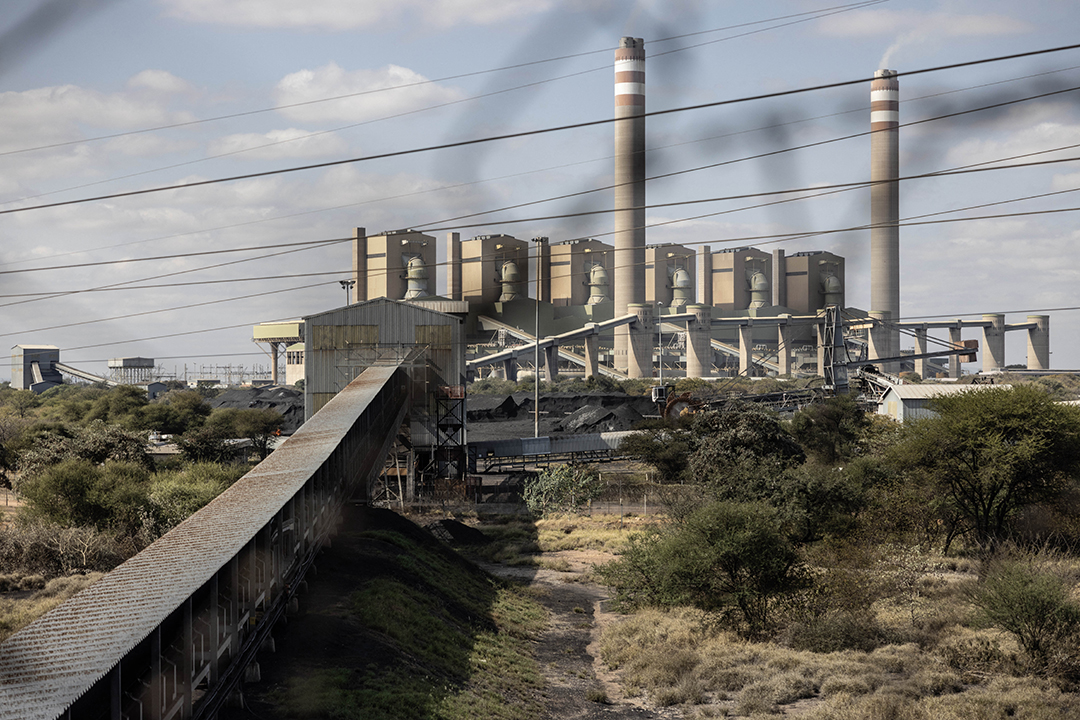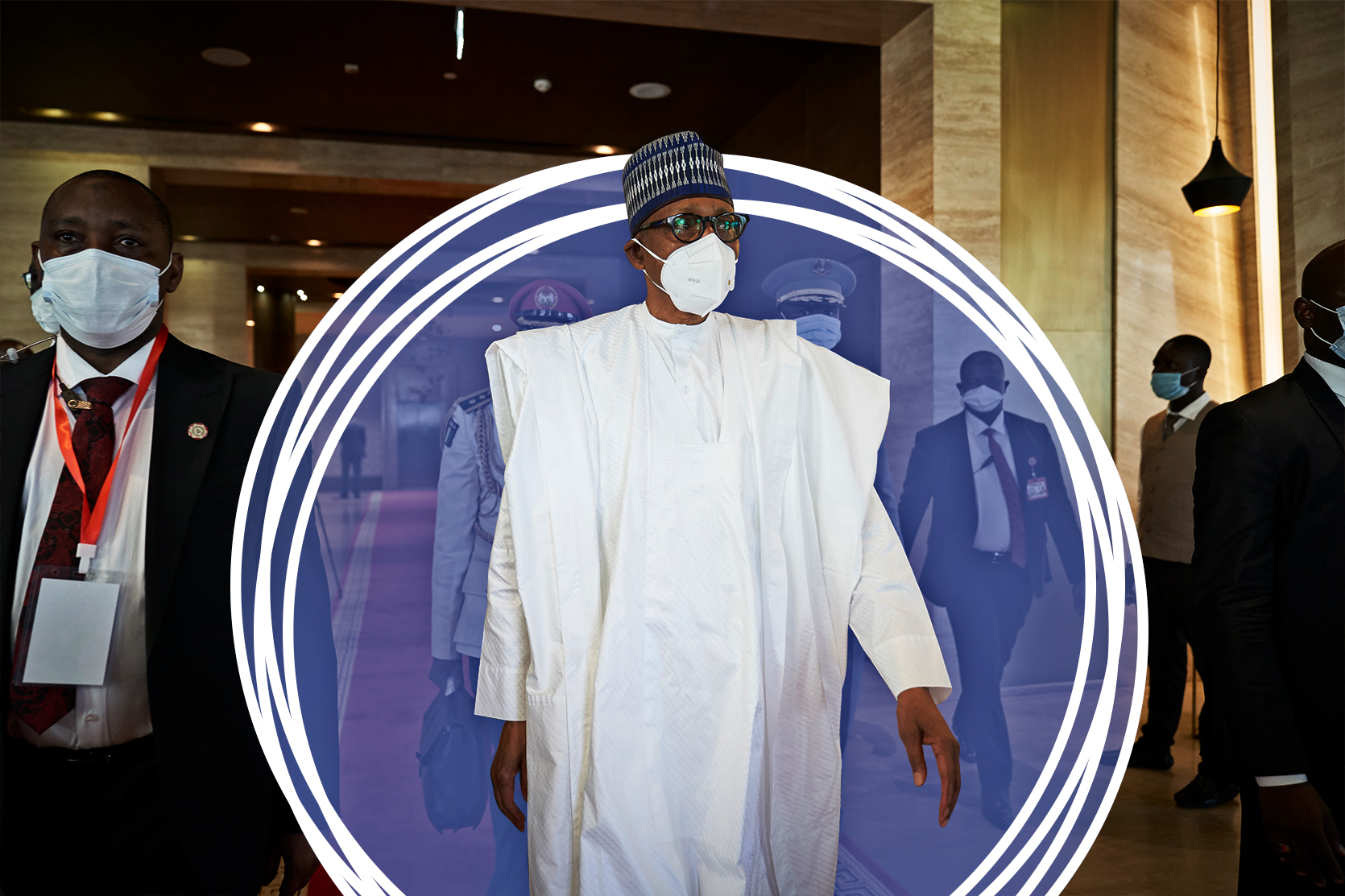A new class action lawsuit being brought against Exarro puts the role of coal in our society firmly in the spotlight. Depending on how one measures it at any given time, South Africa depends on coal for over 80 percent (or 42GW) of its electricity needs. The national transmission grid is almost wholly configured to ingest coal-fired power from Mpumalanga.
This explains why the roughly 6GW of renewable energy potentially available from the last bid window (6) of the Renewable Energy Independent Power Procurement Programme (REIPPP) has not come onstream. Investments in grid upgrades are essentially nonexistent.

Eskom’s Matimba coal-powered power station in Lephalale, Limpopo province, on June 6, 2023. Photo by Paul Botes/AFP
There are insufficient ingestion points in the regions producing complementary wind and solar power (Northern Cape and Eastern Cape). Six GW would have alleviated roughly 30% of the current 20GW deficit and pushed the electricity availability factor back up to manageable, if not acceptable, levels. Unless things change rapidly in the policy landscape, we are stuck with coal for the foreseeable future. This raises a serious conundrum in the context of climate change and talk of a ‘just energy transition’, especially with climate change negotiations at COP28 in Dubai in November/December 2023.
On the one hand, those who see justice primarily in terms of pro-poor industrialisation often seem tempted to argue that coal is just a necessary evil on the road to prosperity. The fact that South Africa is the 14th highest emitter of carbon dioxide in the world is a flash in the pan compared to emissions from China and the US combined. Moreover, it is hardly comparable to the rich world’s consumption-driven ecological footprint. Without electricity, industrialisation is not possible. As it is, South Africa, along with the rest of southern Africa, is experiencing deindustrialisation.
In other words, we are seeing a reduction in manufacturing value-add and a declining share of employment in manufacturing sectors. This is happening earlier, and at lower per capita income levels, than it did with our industrialised counterparts. The latter moved out of manufacturing into high value-added services once manufacturing had generated broad-based wealth.
Premature deindustrialisation, in a nutshell, relegates a country to perpetual middle-to-low income status and high levels of inequality. Coal-fired power, in this argument, is a driver of ‘re-industrialisation’ that will create wealth. We can worry about emissions later – the West, China and India must reduce emissions while we industrialise, as this is only fair. Moreover, the coal mining industry supports thousands of relatively well-paid jobs. Without that income, in the context of serial structural unemployment at around 40%, how could we possibly think of shutting down coal and leaving it in the ground?
On the other hand, those of us who take a more nuanced view of justice object to the above argument along the following lines: We accept that re-industrialisation is a development imperative. However, it is too simplistic to argue that coal is a necessary evil to accomplish that end. The ends do not justify the means. Mining coal carries extensive negative externalities that still go unaccounted for. Negative externalities are the divergence between social costs and private returns. Coal mining (and burning) carries perhaps the most intensive social and environmental externality burden of any economic activity on earth.
Ten years ago, I reviewed a book by physician Allan Lockwood called The Silent Epidemic: Coal and the Hidden Threat to Health. What still haunts me is his point that coal-related deaths are never recorded on death certificates as “coal-induced pneumoconiosis” or related ailments that precipitate early death. While the income from coal jobs keeps extended families alive, the costs of early death directly related to those jobs are devastating and often conveniently ignored. This is tricky terrain. How does one measure whether coal jobs are worth the hidden social and environmental costs, especially when we consider the deleterious impact of coal mining on freshwater supplies in Mpumalanga?
The first step to resolving the conundrum is to recognise the false dichotomy. It is not a matter of coal jobs or poverty. However, it is true that a loss of coal jobs has acute, concentrated impacts. The gains to society from cleaner energy and a more diversified supply of renewables (including small modular nuclear reactors) are diffuse. Foreign investment would flow, which would in turn give confidence to local equity and debt investors to support new projects across all sectors. Investment into new mining exploration pipelines for minerals and metals required to power global energy transitions would also flow, provided we managed to fix our mining governance landscape.
However, any jobs created in renewables will likely be far away from the areas affected by downscaling coal. And even if we were to solve load shedding tomorrow with large-scale renewables, the immediate loss of coal jobs and the negative impacts on those families would cause socio-political grief and potential instability in the absence of a practicable anticipatory plan.
The second step, therefore, is to anticipate the effects of downscaling coal and simultaneously build up renewable projects and a critical raw materials (minerals and metals) exploration pipeline. Anticipating the effects of coal job losses requires significant investment in re-skilling coal workers and transforming the Mpumalanga region into a tourism and agricultural hotspot, fully cleansed from the negative impacts of coal. The tourism potential of the region is underappreciated and therefore underdeveloped. Of course, this new economic vision requires radical governance transformation at local municipal level, but that is a column for another time.
We must move away from easy “whataboutism” and not tolerate the toxic effects of coal’s negative externalities or hidden costs. The environmental and social costs are offloaded onto poor communities who can least afford it. Arguing against coal is hardly unjust to the poor, especially given the suffering coming to light through the Exarro case. We must simultaneously give serious thought to what an appropriate alternative economic vision might look like.
With COP28 in action, and the reality of humanity having cooked six of our nine planetary boundaries, the argument against coal could not be more urgent. Justice is nuanced; a reductionist view provides a smokescreen behind which coal apologists hide. We have to move beyond this and take some tough decisions that ensure a more sustainable future for all of us.
This article first appeared in Business Day, on 5 December 2023.
Dr Ross Harvey is a natural resource economist and policy analyst, and he has been dealing with governance issues in various forms across this sector since 2007. He has a PhD in economics from the University of Cape Town, and his thesis research focused on the political economy of oil and institutional development in Angola and Nigeria. While completing his PhD, Ross worked as a senior researcher on extractive industries and wildlife governance at the South African Institute of International Affairs (SAIIA), and in May 2019 became an independent conservation consultant. Ross’s task at GGA is to establish a non-renewable natural resources project (extractive industries) to ensure that the industry becomes genuinely sustainable and contributes to Africa achieving the Sustainable Development Goals (SDGs). Ross was appointed Director of Research and Programmes at GGA in May 2020.







